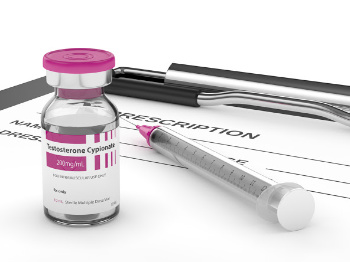
An auto-injector used to administer testosterone enanthate “has a favorable safety profile and is well-tolerated,” according to a new journal of Sexual Medicine study.
The device offers a convenient option for men on testosterone replacement therapy, allowing them to self-administer their medicine at home.
Testosterone is a male sex hormone that gives men their masculine traits. It’s also important for sex drive and erections. When men have a testosterone deficiency, they may feel moody, fatigued, and less interested in sex. For some men, testosterone replacement therapy relieves those symptoms.
Self-injectable testosterone was approved by the U.S. Food and Drug Administration in October 2018 for men whose bodies cannot produce adequate amounts of testosterone on their own. It has not been approved for men whose testosterone levels decline as a normal part of aging.
The study involved 133 men between the ages of 18 and 75 who had testosterone deficiency with symptoms. (Low testosterone, in this case, was diagnosed at levels below 300 ng/dL.)
After learning to use the device, the participants began self-injecting 75 mg of testosterone enanthate once a week. Their goal was to keep their testosterone levels between 350 and 650 ng/dL. Over the study period, doses were adjusted based on individual need, but doses always stayed between 50 and 100 mg.
Periodically during the study, the men underwent ambulatory blood pressure monitoring (ABPM), wearing a special device designed to measure their blood pressure for 24 hours.
For most men, testosterone levels remained at the targeted range. After 26 weeks, 83% of the patients had levels between 300 and 650 ng/dL.
About a quarter of the men had adverse drug reactions, including raised levels of hematocrit (the volume of red blood cells in the blood), hemorrhage at the injection site, bruising, and increases in prostate-specific antigen (PSA) levels. One man had mild pain at the injection site.
Blood pressure monitoring data showed a “small” average increase in the men’s blood pressure over the study period, but none of the men had adverse drug reactions related to blood pressure. In addition, the researchers found no correlation between testosterone and blood pressure.
They noted, however, that for safety reasons, most medical studies of testosterone exclude men with uncontrolled blood pressure. This study followed the same guidelines, so it wasn’t clear whether men who had uncontrolled high blood pressure would have the same results.
“It is for this reason that the prescribing information emphasizes [blood pressure] control before and during use of this product,” the authors wrote.
Overall, they concluded that testosterone delivery with this type of auto-injector was safe and well-tolerated, but they did not know if the results would apply to other forms of testosterone delivery, such as patches and gels.
The Journal of Sexual Medicine
Gittelman, Marc, MD, et al.
“Safety of a New Subcutaneous Testosterone Enanthate Auto-Injector: Results of a 26-Week Study”
(Full-text. Published online: September 21, 2019)
https://www.jsm.jsexmed.org/article/S1743-6095(19)31376-1/fulltext
SexHealthMatters
“Self-Injectable Testosterone Now Available”
https://www.sexhealthmatters.org/did-you-know/self-injectable-testosterone-now-available
You may also be interested in...
Other Popular Articles

What Is the Average Penis Size?
If you have ever wondered how your penis compares to others in terms of size, you are not alone. Many men are curious to know how their penises stack up compared to the average. Unfortunately, general curiosity can sometimes give way to full-on obsession and anxiety about penis size. This can be an unhealthy and often unnecessary fixation, especially because most men who think their penises are too small have perfectly normal-sized penises.

What Is Jelqing, and Does It Actually Work?
The term “jelqing” refers to a set of penis stretching exercises that some believe can make the penis bigger. Although the practice has gained attention and popularity in blogs and internet forums in recent years, there is no scientific evidence that it is an effective way to permanently increase the size of one’s penis. In fact, in some cases, jelqing may actually cause damage to the penis, so it is a good idea to get all the facts before setting off to try it.

What Is Sensate Focus and How Does It Work?
Sensate focus is a technique used to improve intimacy and communication between partners around sex, reduce sexual performance anxiety, and shift away from ingrained, goal-oriented sexual patterns that may not be serving a couple.

Can Sex Reduce Menstrual Cramps?
The SMSNA periodically receives and publishes ‘guest editorials.’ The current article was submitted by Mia Barnes, a freelance writer and researcher who specializes in women's health, wellness, and healthy living. She is the Founder and Editor-in-Chief of Body+Mind Magazine.
Having sex while you experience menstrual cramps is healthy and can provide significant benefits. While it might not be the first activity that comes to mind when your PMS or period cramping begins, many people enjoy sex to reduce menstrual cramps, experience increased pleasure and benefit from other advantages. Learn more about having sex while menstrual cramps are happening and how it can help your body.

How Long Does It Take the Average Man to Ejaculate?
On average, it takes a man between 5 to 7 minutes to orgasm and ejaculate during sexual intercourse.

Can Sex Throw off Your Vaginal pH Balance?
The SMSNA periodically receives and publishes ‘guest editorials.’ The current article was submitted by Mia Barnes, a freelance writer and researcher who specializes in women's health, wellness, and healthy living. She is the Founder and Editor-in-Chief of Body+Mind Magazine.
Your vagina is a pretty powerful organ. It is a pathway for menstrual blood and babies. It also is a main player in sexual intercourse. You might hear about your vagina’s pH and worry that yours is at risk. Here’s what to know about vaginal pH, including the impacts sex could have.
You are prohibited from using or uploading content you accessed through this website into external applications, bots, software, or websites, including those using artificial intelligence technologies and infrastructure, including deep learning, machine learning and large language models and generative AI.

